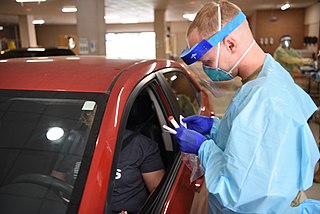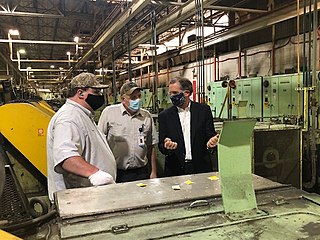COVID-19 pandemic in Arkansas
On March 11, Governor Asa Hutchinson confirmed the state's first presumptive positive coronavirus case in Pine Bluff.
The Arkansas Department of Health worked with the church and used contact tracing to identify an additional 26 people confirmed to have the virus, one of which died.
[13] On March 17, Governor Hutchinson ordered all casinos closed for two weeks and said that for the next 30 days, the one-week waiting period and work reporting requirement to receive unemployment benefits would be waived.
[14] On March 18, Governor Hutchinson said the state was working to allocate $12 million in federal Community Development Block Grant funds, aiming to target hospitals and other businesses essential to the coronavirus response.
Additionally, he said he would allocate $4 million from the state's Quick Action Closing Fund which would provide loans of up to $250,000 to help businesses make payroll and stay open.
[17] On March 20, thirteen new cases were reported that were connected to a nursing home in Little Rock where four staff and nine residents tested positive.
Education Secretary Johnny Key said that the state would apply for a federal government waiver to standardized testing requirements.
Attorney General Leslie Rutledge said an additional $3 million would be added to the loan program for small businesses that the governor announced on March 18.
[19] On March 21, the state projected the spread of the virus would peak in 6 to 8 weeks, at which time there would be an estimated 1,000 Arkansans hospitalized with the disease.
[20] On March 22, Arkansas reported that the state received 25 percent of the PPE requested from the federal government's national stockpile.
Due to such a high number of claims, Governor Hutchinson said he would ask the Arkansas General Assembly to approve $1.1 million from the rainy day fund for upgrades to the unemployment system.
Secretary of Commerce Mike Preston said the Arkansas Economic Development Commission had received around 300 calls and emails inquiring about the business loans the governor had outlined earlier in the week.
[21][22] The individual income tax filing deadline was moved to July 15 and Governor Hutchinson planned to call for a special legislative session to deal with expected budget shortfalls due to the pandemic.
Both Governor Hutchinson and Dr. Nate Smith remarked that April 12 would be too early for the state to return to normal operations, which is the date U.S. president Donald Trump had targeted during an interview earlier in the day.
The state legislative leaders approved Governor Hutchinson's request to use $45 million from the newly created COVID-19 rainy-day fund.
Governor Hutchinson made a recommendation to the United States Secretary of the Interior, David Bernhardt, that the Buffalo National River be closed.
[35] On April 4, Governor Hutchinson signed an executive order limiting the types of guests that can stay at hotels, motels, and vacation rentals to: healthcare professionals; first responders; law enforcement; state or federal employees on official business; National Guard members on active duty; airline crew members; patients of hospitals and their families; journalists; persons unable to return to their home due to COVID-19 travel restrictions; Arkansas citizens unable to return to their home due to exigent circumstances, such as fire, flood, tornado, or other disaster; persons in need of shelter due to domestic violence or homelessness; employees of hotels, motels, or other service providers/contractors of a hotel or motel; and persons away from their home due to work or work-related travel.
[40] On April 28, Secretary Hurst announced that beginning May 1, Arkansas residents with self-contained campers would be allowed to return to state parks, and that overnight cabins and lodges would reopen for weekend stays for in-state residents beginning May 15, along with restaurants and food service within parks, museums, exhibits, and visitors centers.
He announced a $15 million grant program to help business pay for expenses related to reopening with the funds coming from money the state received from the federal Coronavirus Aid, Relief, and Economic Security Act.
[43] On May 4, Governor Hutchinson announced that large indoor venues could reopen on May 18 for audiences of fewer than 50, with strict social distancing protocols among those in attendance and performers.
[44] On May 23, Governor Hutchinson cautioned Arkansas residents to maintain social distancing on Memorial Day weekend when a cluster of coronavirus cases occurred after a high school swim party that month.
On October 11, The Baptist Health Center for Clinical Research announced the need for 800 volunteers from the state for a 25-month COVID-19 vaccine trial in conjunction with drug manufacturer Moderna.
[61] On October 14, the state received over 100,000 rapid testing kits from the White House which the Governor planned on prioritizing to for schools, department of correction personnel, and human resource services.
[64] Governor Hutchinson announced in a briefing the limiting future appearances, after being potentially exposed the previous week to one state senator and two house members who tested positive for COVID-19.
Asa Hutchinson of Arkansas said on 2 July low vaccination rates in his state are the reason covid cases are skyrocketing there.
Due to a dramatic increase in COVID-19 cases, as of July 30, 2021, all seven of Arkansas's national park service sites enforced mask mandates.
[14] On March 19, Hutchinson announced new measures to help limit the spread of the disease, including keeping public schools closed through April 17 and banning restaurants and bars from providing dine-in services.
[86] On March 16, the Fayetteville city council voted unanimously to grant the mayor emergency powers to regulate gatherings.
[91] After a delayed start date for the Fall semester for Arkansas public schools was announced by Governor Hutchinson (during the week of August 24), several groups objected to this plan.
[100] The University of Arkansas at Monticello (UAM) announced on March 17 that all instructions would move to an online setting through the end of the semester.

